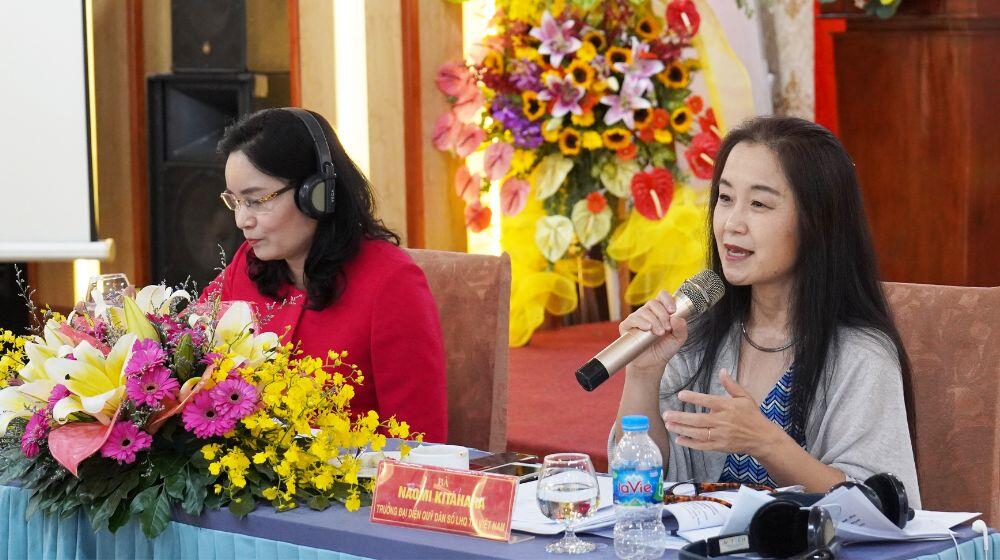Viet Nam, 15 June 2022 – Viet Nam is strongly committed to ending domestic violence and is in the process of amending its 2007 Law on Domestic Violence Prevention and Control, following UNFPA’s advice to take survivors of gender-based and domestic violence as the centre.
The survivor-centred approach aims to protect the rights of survivors of violence, who are mainly women and girls, and to ensure that their needs and voices are taken into account and being heard seriously, especially in the context of Viet Nam where violence against women and girls is mostly hidden. It also requests the duty bearers and decision-makers to pay further attention and provide financial and technical resources during the implementation of the Law.
The Ministry of Culture, Sport and Tourism has been assigned by the State to amend the 2007 Law and during the drafting process, the Ministry in collaboration with UNFPA has conducted many technical meetings and consultation workshops with the related Government ministries and agencies, provincial and municipal authorities, UN agencies as well international and national organisations and experts at national and sub-national levels.
In early June 2022, while Deputies to the National Assembly of Viet Nam discussed the amended Law on Domestic Violence Prevention and Control in Hanoi, representatives from the local authorities of southern provinces and cities met in Vung Tau to share their feedback and comments on the amended Law to ensure that practical experiences in addressing domestic violence and violence against women are fully reflected in the amendment.
“The amended law on domestic violence prevention and control should identify a mechanism to protect and respect the rights of survivors of domestic violence, and those of women and girls at risk of violence,” said Ms. Tran Thi Yen, Deputy Head of the Culture Division, Ho Chi Minh City Peoples’ Council.
Her view was shared by other participants during the discussion, which was co-chaired by the Vice Minister of Culture, Sports and Tourism, Ms. Trinh Thi Thuy, and the UNFPA Representative in Viet Nam, Ms. Naomi Kitahara.
Among other rights of domestic violence survivors, Ms. Tran Thi Yen from HCMC People’s Council also stressed that the amended Law should add the right to choose a place to stay. And this also means that there should be other stronger measures to prevent perpetrators to continue with violence.
Commenting on the provision of a non-contact order, which can be issued by local authorities as a short-term measure, and by court for a longer period of time. The question raised at the consultation workshop was: “should it be the survivor who needs to leave the house, or the perpetrator?” Some countries have indeed arranged on the departure of the perpetrator from the residence if the survivor chooses to stay at home. “Can Viet Nam also ensure such a provision?”
Vice Chairman of People’s Committee of Long An province, Mr. Pham Tan Hoa said: “For the safety of the survivors of domestic violence, first and foremost, severe punishments must be given to the perpetrators. It is the perpetrator who has to leave the house and the amended Law should include a provision of a place to keep the perpetrator away from the survivors.”
Ms Tran Thi Thu Thuy from Can Tho city added: “In addition to administrative punishments, community services should be included. The perpetrators have to work at the centres for lonely older persons or at the orphanages.”
The consultation workshop also emphasised that in many cases, survivors leave the house without money, clothing, or essentials. As such, some allowances to a survivor should be provided by the State, but the question is how much is reasonable? VND30,000 was initially proposed, but in Viet Nam, a bowl of pho already costs VND35,000. And for how many days can we help the survivor with such allowances?
The participants also discussed what services should be provided free of charge. While there was a consensus of providing essential services to the survivors of violence, including medical, counselling, social, and police protection, it was found challenging to also ensure free legal aid, particularly for court proceedings. And what about sign languages for people with disabilities, or interpretation services for ethnic minorities – can these also be provided free of charge?
And above all, shouldn’t domestic violence be criminalized? In the current criminal code, violence in the street is criminalized, but violence at home is not. Domestic violence happens in power imbalances, so can reconciliation before criminalisation be so effective? Should reconciliation be mandatory for a survivor to proceed with legal services and justice proceedings?
“These details should be reflected in the draft amended Law on Domestic Violence Prevention and control. We must not leave anyone behind in Viet Nam’s sustainable development process, and that includes survivors of violence, and women and children at risk of violence,” concluded Ms. Naomi Kitahara, UNFPA Representative at the consultation workshop.
The amended Law is planned to be reviewed again and be approved by the National Assembly at its next session in October.
It’s high time to amend the 2007 Law on Domestic Violence Prevention and Control
The findings of the 2019 National Study on Violence against Women in Viet Nam, which was conducted by the General Statistics Office with support from UNFPA and the Government of Australia, showed little change in the prevalence of violence, compared to the first study conducted in 2010. In Viet Nam, 62.9% of women still experience one or more forms of physical, sexual, emotional and economic violence, and controlling behaviours by their husband in their lifetime. In addition, violence is very much hidden in Viet Nam’s society, as 90.4% of gender-based violence survivors do not seek any help from authorities, and half of them never tell anyone about the violence. As yet, violence against women is costing the country 1.81% of GDP in 2018.


